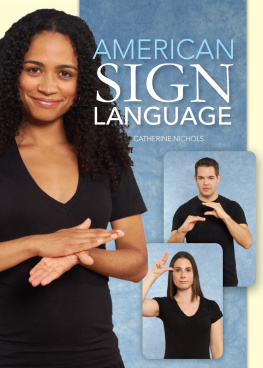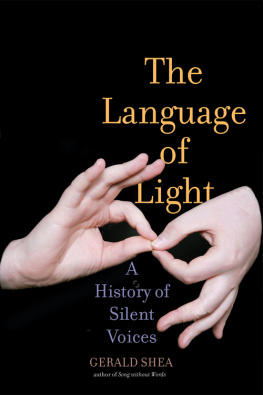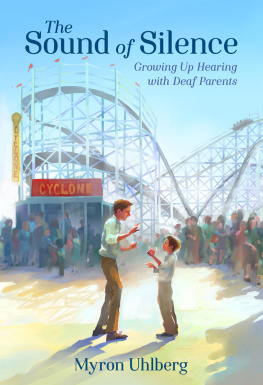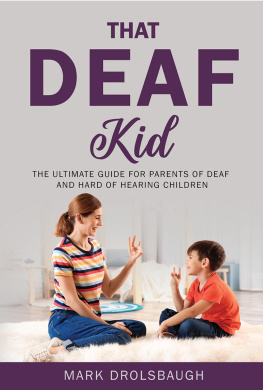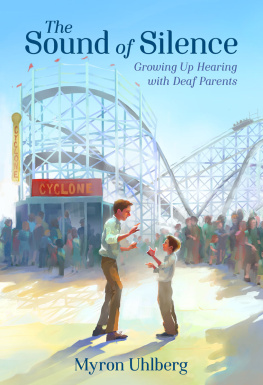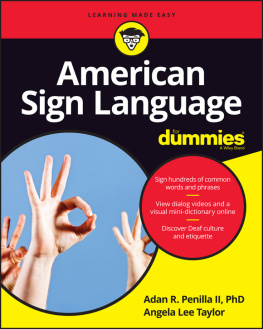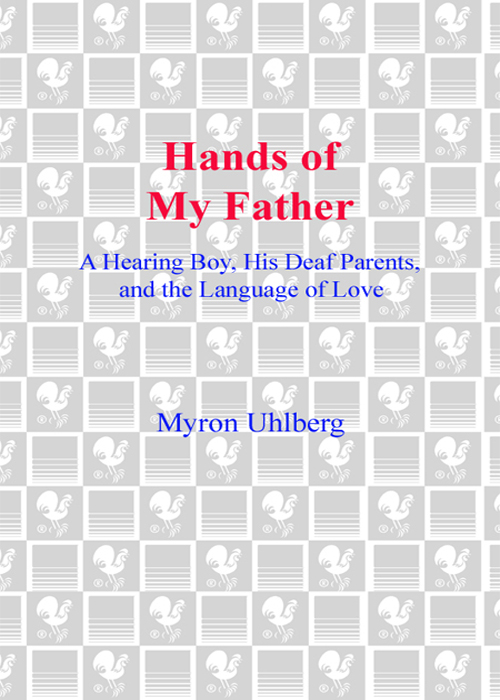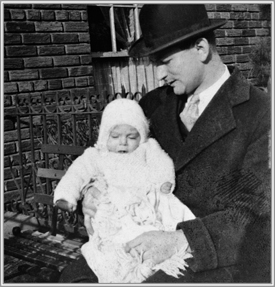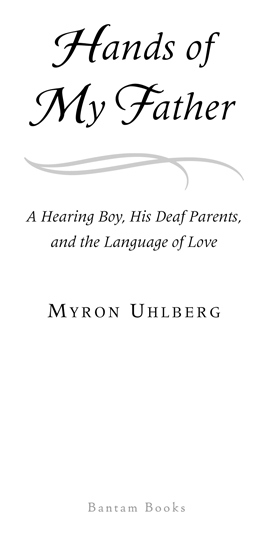My parents were deaf, and spoke with their hands, employing signs rather than spoken words to communicate. Today, their language is known as ASL (American Sign Language). Being faithful to the time period of this story, I refer to their language as sign and not Sign. Further, I refer to them as being deaf, the physical condition, as opposed to the conventional Deaf, used today to indicate the full complexity of Deaf culture.
Finally, as ASL is a visual-gestural language, I have transliterated their conversations from ASL to English. Those conversations, spoken some sixty to seventy years agoconventionally represented in quotation marksare not meant to be a word-for-word rendition of what was said, but are, rather, the essence of what was meant.
I have also changed some names in my account.
Gore Vidal observed, in his excellent memoir, Palimpsest, A memoir is how one remembers one's own life. He then went on to say, even an idling memory is apt to get right what matters most. This memoir is how I remember my life growing up with my deaf parents, and to the best of my ability I've made every effort to get right what matters most. They deserve no less from me, their son.
Acknowledgements

This book would not have been possible without the help of many people.
To Susan Schulman, my agent and friend who suggested that I write this book, and when I had done so, said, I always place a book that I love. And she did.
To Emily Uhry whose encouragement and advice in the earliest stages helped shape this book.
To Beth Rashbaum, my editor, who saw in my manuscript a possible book, and then with unlimited patience, goodwill, superb advice, and a firm hand, transformed a disjointed manuscript into the book you now hold in your hand. I owe you more than I can say.
And to her assistant, Angela Polidoro, for her blazingly quick responses to my every question.
Special thanks also to Virginia Norey for her heartfelt design of this book.
To Sue Tarsky dear old friend who, after a long absence, reentered my life in time to suggest that I could have a second (even a third) career as a writer; and then went out and promptly sold my first two children's books. You changed my life.
To Margaret Quinlin, dear friend, kind soul, dispenser of wisdom in all things literary and beyond, who from the very beginning validated me as a writer.
To Ellen W. Leroe, Eleanor Garner, Milly Lee (elder sister), Adrian Fogelin, and, most especially, to Bob and Sandy Weintraub, all writers and staunch friends, to whom I turn for suggestions, advice, and encouragement.
To Sandra Yoon and Pat Lindsay, for their kindness; to Helen Foster Harris for her earliest support; and to Nancy Fritzal, my favorite librarian.
To my fellow CODAs (Children of Deaf Adults), and good friends, Tom Bull, Joyce Linden, and Allyne Bettancourt, for sharing your stories about growing up hearing with deaf parents, and for giving me the encouragement at every step of the way to tell my own story. And to all my CODA brothers and sisters, I respect you and love you all.
To my Brandis Band of Brothers, almost sixty years and counting, Eddie Manganiello, Charlie Herman, Dick Baldacci, Leo Surette, Jim Stehlin, Bill Orman, Larry Glazer, Tommy Egan, Ron Ranier, Mike Long, Pat Sirkus, Roger Morgan, Dick Bergel, Dave Burman, Ray Deveaux, Rudy Finderson, Mel Nash, and in memory, Hank Thunhorst, Phil Goldstein, Charlie Napoli, Morry Stein, and Jack Kirkwood.
To Joe Big Red O'Connor, who listened with sympathy and patience to a problem I had encountered in the writing of this book, and then calmly suggested how I might solve it.
To the best friends a man could ever wish for, Bill McKenna, and in blessed memory, Bob Domozych and Dick Collins, who first met my parents when we were just boys at Brandis, and who over the years constantly assured me that a book about them would find readers.
To my friends in the Deaf education community, Michelle Gennaoui, Jennifer Storey, and Nancy Boone, who told me as I was writing this book that this was a story that should be told.
To my football coaches: Harry Ostro, at Lafayette High School; Irv Heller, at Brandis University, and in loving memory of Benny Friedman, two-time college All-American, enshrined in the Pro Football Hall of Fame, and the first athletic director and only football coach at Brandis University, and his beloved assistant, Harry Stein. I met them as a boy, and they showed me the way to become a man.
To Cindy Bowman, for her friendship, uncritical support, and for showing me what real courage looks like.
To my Brooklyn friends Lenny Lefkowitz, Tommy La Spada, Vico Confino, and in memory, Sam Mark, whom I called incessantly when I was writing about our Brooklyn childhood, checking my memories against theirs.
To Larry Ohrbach and Robert Sax, dear friends who supported me every step of the way in the writing of this book. And special appreciation for the friendship and sound advice of my oldest of friends, Eva and Sam Beller, and George and Sally McGlinnen.
This memoir owes much to my uncle, Milton Wolff, who in the years before his death shared with me his memoriesand regrets about growing up with his deaf sister, Sarah.
To Susan Wolff, daughter of my uncle Milton Wolff, who shared her memories of her complicated father as well as those of our equally complicated grandmother, Celia; and to Jerry Posner, and David and Roberta Trager, who did the same for their parents, my father's younger sisters; and in memory of my cousin, Irving Posner, who would tell me his stories about our grandparents, David and Rebecca.
To my children, Eric, Robin, and Ken, who loved their deaf grandparents, and of whom I am so proud; and to my granddaughters, Alex and Kelli, and my grandsons, Max and Miles, who will one day read this book, and understand.
I am especially grateful to my brother, Irwin, with whom I consulted throughout the writing of this memoir, for his willingness to share with me his memories as well as his deepest feelings about growing up with our deaf parents.
And, as always, to my amazing wife, Karen, my best friend, my first reader, and most trusted advisor in all things literary and otherwise, who at every turn in my life said, Why not? You read every chapter, and then, knowing and loving my parents as you did, you told me, with unfailing honesty, and in as few words as possible, whether I had done their story justice. For this, as well as for more than I can say, I am forever grateful to you.
Contents



